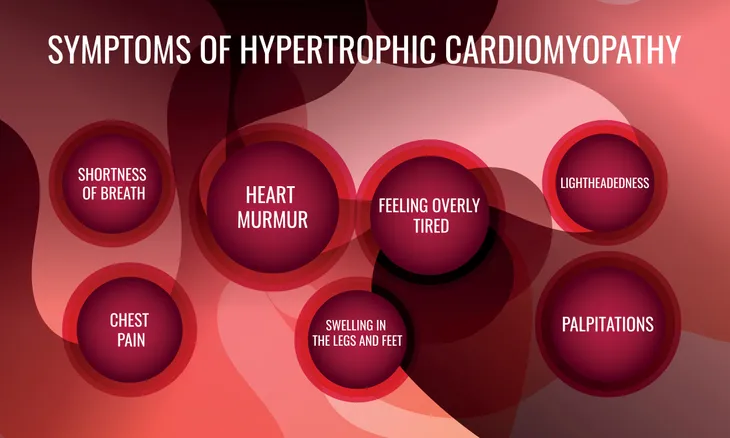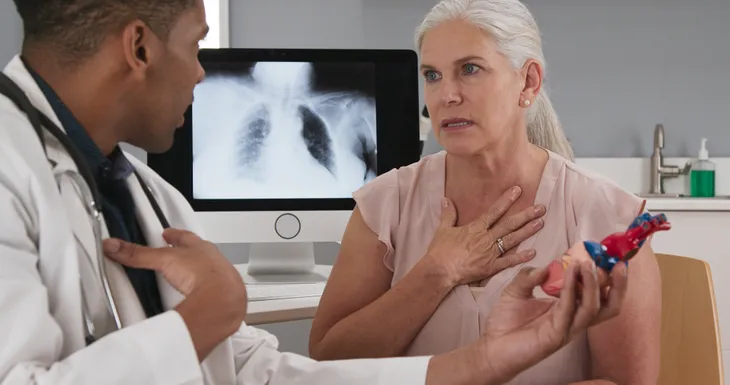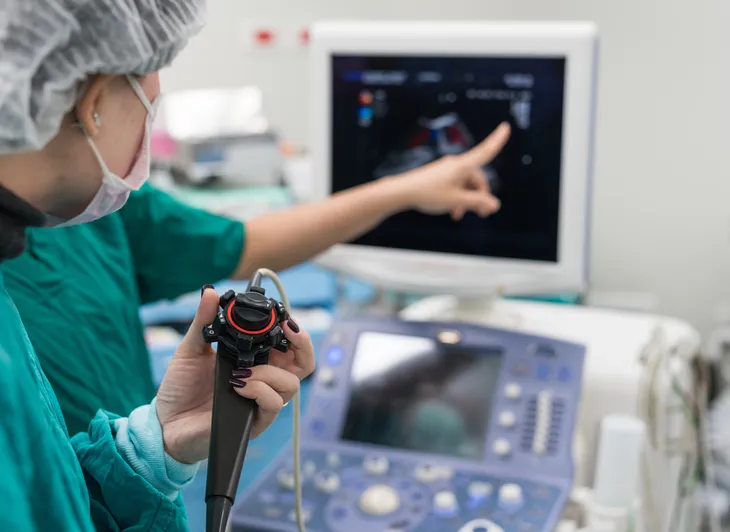- Hypertrophic cardiomyopathy is a cardiovascular condition that causes an abnormal thickening of the heart muscles.
- Thickening of the heart muscles can make it difficult for the heart to pump blood.
- Some individuals experience no symptoms. If they do occur, they include heart palpitations, shortness of breath, chest pain, and abnormal heart rhythms.
- At present, there is no cure for hypertrophic cardiomyopathy, but it can often be managed with surgical procedures and medications.
Hypertrophic cardiomyopathy (HCM) is a medical condition that causes the heart muscles to thicken, potentially affecting its ability to pump blood to the body’s organs. Approximately 0.2-percent of the U.S. population is affected by hypertrophic cardiomyopathy, and the severity of symptoms can vary from person to person.
Treatments for the condition range from medication and lifestyle changes to surgical procedures. To learn more about hypertrophic cardiomyopathy, we’ve compiled a list of the signs, symptoms, causes, and treatment options…
Signs and Symptoms of Hypertrophic Cardiomyopathy
In some cases, individuals with hypertrophic cardiomyopathy do not experience any symptoms. When symptoms do occur, they sometimes occur following periods of physical exertion. Some common symptoms of HCM include fatigue, shortness of breath and chest pain.
HCM can also cause dizzy spells that may lead to fainting, and individuals may experience symptoms of heart palpitations such as pounding or fluttering heartbeats. Since many signs of HCM can mimic those of other conditions, it’s always essential to consult with a physician if you experience any sudden, unexplained symptoms or discomfort.
What Causes Hypertrophic Cardiomyopathy?
Most cases of hypertrophic cardiomyopathy are due to abnormal heart muscle genes that cause the muscles in the left ventricle walls to thicken and stiffen. Most often, the genetic variant is inherited, but certain individuals who inherit the variant do not develop HCM.
In some cases, emotional stressors may lead to symptoms such as heart palpitations and chest pain in people with the HCM gene mutation, and symptom onset can occur as early as birth to age 80 and older.
Can Hypertrophic Cardiomyopathy Lead to Heart Attack or Heart Failure?
While many individuals with HCM live normal lives without experiencing any symptoms, the condition can lead to serious complications such as sudden cardiac arrest and heart failure. In some cases, sudden cardiac arrest can be fatal, and it often occurs in younger adults with undiagnosed HCM.
The thickening of the heart muscle walls can interfere with the heart’s blood-pumping process. When the other organs don’t receive enough blood, this can lead to heart failure in certain individuals with hypertrophic cardiomyopathy.
Obstructive Hypertrophic Cardiomyopathy vs. Non-Obstructive Hypertrophic Cardiomyopathy
The two types of HCM are obstructive hypertrophic cardiomyopathy and non-obstructive hypertrophic cardiomyopathy. Obstructive HCM is the most common type of the condition. With obstructive HCM, the thickened areas of the heart muscle create an obstruction that can hinder blood flow from the left ventricle into the aorta and the other organs of the body.
Non-obstructive hypertrophic cardiomyopathy also causes heart muscle thickening, but this type of HCM does not disrupt the heart’s blood-pumping process.
Is There a Cure for Hypertrophic Cardiomyopathy?
At present, there is no cure for hypertrophic cardiomyopathy, but there are both medications and medical procedures that can help individuals manage symptoms throughout their lives. Specific treatment regimens can vary greatly depending on factors such as the severity of symptoms and whether the condition is obstructive or non-obstructive.
Individuals with HCM and other conditions such as high blood pressure or diabetes must also make sure to follow their physician’s recommendations on symptom management and medication to prevent possible complications.
Tests and Diagnostic Procedures for Hypertrophic Cardiomyopathy
HCM is typically diagnosed through physical examinations and various diagnostic tests. During a physical exam, the physician may use a stethoscope to listen to your heart and lungs and check for indicative signs of hypertrophic cardiomyopathy. Additional diagnostic tests may be ordered if HCM is suspected following a physical exam.
Echocardiogram testing utilizes sound waves to assess the size and shape of the heart and determine how well the heart is working. An echocardiogram is the most common procedure for diagnosing HCM. Additional testing and diagnostic procedures include blood tests, heart muscle biopsies, chest X-rays, and Holter monitors to monitor heart activity over 24-48 hour periods.
Common Medications Prescribed for Hypertrophic Cardiomyopathy
Beta blockers and calcium channel blockers are two common types of medications prescribed to help individuals manage symptoms of HCM. Both of these medications work to relax the heart muscle. Beta blockers are designed to block adrenaline production and regulate the heartbeat, while calcium channel blockers help minimize symptoms such as heart palpitations and chest pain.
Antiarrhythmic medications and medications designed to prevent heart contractions are also prescribed for hypertrophic cardiomyopathy. Specific medication recommendations can vary based on an individual’s specific symptoms and potential underlying health conditions.
Medical Procedures for Hypertrophic Cardiomyopathy
Surgical and non-surgical medical procedures are sometimes recommended for individuals with HCM who experience mild to severe symptoms. Open-heart surgery to remove part of the thickened heart muscle can benefit individuals with obstructive HCM. Cardiac implantable electronic devices such as pacemakers or cardioverter defibrillators can help to regulate heartbeats and prompt the heart to beat at normal, healthy rates.
In cases of advanced or end-stage hypertrophic cardiomyopathy, health care teams may recommend heart transplant procedures in which the diseased heart is surgically removed and replaced with a matching healthy donor heart.
Lifestyle Changes to Help Manage Hypertrophic Cardiomyopathy Symptoms
While HCM is considered a chronic disease, lifestyle changes can often help reduce symptoms and prevent complications. Daily exercise promotes cardiovascular health and may help lower blood pressure and aid in weight loss.
Maintaining healthy teeth and gums with daily brushing and flossing and regular dental cleanings can help to reduce the risk of gum infections that can sometimes spread to the heart, and consuming a heart-healthy diet may help lower the risk of high cholesterol and cardiovascular diseases.
Can Hypertrophic Cardiomyopathy Symptoms Improve or Worsen Over Time?
Hypertrophic cardiomyopathy symptoms can often improve over time with the help of medications, medical procedures and lifestyle changes. Regular medical checkups are essential for individuals with HCM, as they allow health care professionals to identify and treat potential issues as soon as possible to prevent complications.
In some cases of HCM, symptoms can worsen over time, leading to complications such as blood clots and stroke. The progression of HCM varies significantly from person to person. Some cases progress rapidly and cause serious complications, such as cardiac arrest, while others slowly progress over time.
Possible Complications of Hypertrophic Cardiomyopathy
Potential complications of HCM can include atrial fibrillation or AFIB, mitral valve disease and blocked blood flow. HCM causes thickening of the heart muscle and cell changes, which can directly affect the heart’s electrical system. This can lead to symptoms of AFIB, such as irregular or fast heartbeats. Mitral valve disease is a condition in which the blood from the heart leaks backward into the left mitral valve.
HCM can cause mitral valve disease if the thickened heart muscle prevents the left mitral valve from closing. Blocked blood flow occurs when the thick heart muscle in an individual with HCM prevents the blood from leaving the heart. Signs of blocked blood flow due to HCM can include chest pain, fainting and dizziness.
Outlook For Individuals With Hypertrophic Cardiomyopathy
In most cases, the overall outlook for individuals with hypertrophic cardiomyopathy is good. With proper medication, medical procedures and lifestyle changes, many people with the condition live full, healthy lives without complications. However, a portion of those affected by HCM may be at higher risk for cardiovascular issues ranging from high blood pressure to heart attack and heart failure.
Underlying health conditions such as diabetes and kidney disease can contribute to complications of HCM, and lifestyle habits such as alcohol and tobacco consumption may worsen HCM symptoms. Since hypertrophic cardiomyopathy symptoms and overall disease progression can vary from person to person, those with the condition need to follow the recommendations of their health care teams to ensure the best possible outcomes.















